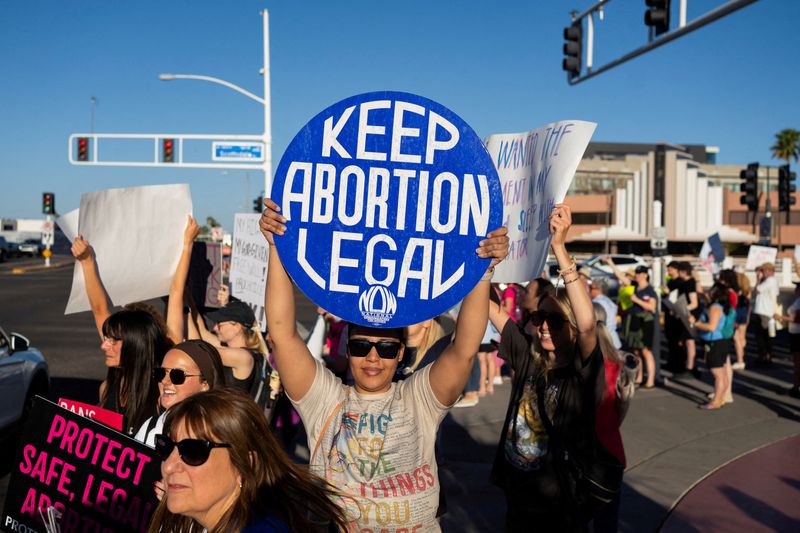By Brendan Pierson
(Reuters) - Nearly two years after the U.S. Supreme Court overturned its landmark 1973 ruling in Roe v. Wade, litigation over abortion has exploded.
Justice Samuel Alito wrote in 2022's Dobbs v. Jackson Women's Health Organization that the court's longstanding precedent had "enflamed debate and deepened division." He said it was time to take the abortion issue out of the hands of the court and return it "to the people's elected representatives."
But, rather than limit court battles there are a dizzying number of state court cases challenging various aspects of abortion bans or restrictions imposed by more than 20 Republican-led states in the wake of Roe's reversal. Many key issues are unresolved, and one abortion-related case is still before the Supreme Court.
Here is a look at the different kinds of lawsuits pending, and where these challenges are brewing.
LAWSUITS CHALLENGING BANS OUTRIGHT
For decades, abortion rights advocates could challenge abortion restrictions in federal court citing Roe v. Wade. With that shield gone, they have instead shifted to bringing their cases in state courts, arguing that bans or restrictions on abortions infringe women's rights to privacy, liberty or due process guaranteed in state constitutions.
In all states where challenges have been fought to a final ruling from the state's highest court - including in Florida, Idaho and Texas - new restrictive abortion laws have been upheld. No new ban has been permanently struck down.
Other such challenges, however, remain pending, including in Georgia, Utah and Wyoming. In South Carolina, a ban on abortion after the detection of a fetal "heartbeat" has largely been upheld, but the case remains ongoing as plaintiffs are asking the court to rule that the ban begins at around nine weeks of pregnancy, when the chambers of the fetal heart are formed, and not six when electrical activity is detected.
And some cases asserting a fundamental right to abortion challenge not new state bans, but local laws, as in New Mexico, or 19th century laws that have long been unenforced, as in Wisconsin.
ABORTION PILLS
Medication abortion, which uses the drugs mifepristone and misoprostol to induce abortion in early pregnancy, accounted for 63% of U.S. abortions last year, up from 53% in 2020, according to the Guttmacher Institute, an abortion rights research organization.
Anti-abortion advocates have sought to restrict mifepristone's availability, concerned that pills can be easily obtained even in states where abortion is banned.
The Supreme Court last week rejected an appeal by abortion opponents that would have significantly restricted mifepristone's distribution in all states if successful. However, similar claims by three Republican-led states remain pending in a lower court.
At the same time, lawsuits by abortion rights advocates seek to expand or preserve access to the drug in Virginia and Washington state. Another such case filed in North Carolina will likely be appealed to the 4th U.S. Circuit Court of Appeals after a judge struck down some restrictions on mifepristone in that state.
MEDICAL EMERGENCIES
A growing number of cases center on exceptions in abortion bans for women facing medical emergencies. These lawsuits argue that the exceptions, which typically allow an abortion to be performed only to save the mother's life and sometimes to prevent serious injury, violate women's basic rights, or are so unclear that doctors do not know when they apply and are therefore afraid to rely on them.
Such lawsuits are currently pending in states, including Indiana, Tennessee, North Dakota and Idaho. The Idaho case is over whether the state's abortion ban conflicts with a federal law requiring emergency rooms to stabilize patients, currently on appeal before the Supreme Court, and could affect care in other states as well.
The Texas Supreme Court, meanwhile, recently rejected a challenge seeking to broaden and clarify the state's medical exception.
INTERSTATE TRAVEL
Several states and counties where abortion is banned have passed measures aimed at making it more difficult for their residents to travel to other states to get the procedure, raising new legal issues about governments' ability to legislate conduct outside of their borders.
Lawsuits over such measures are currently pending in Alabama, which criminalizes helping anyone obtain an abortion, and Idaho, which is seeking to revive a state law prohibiting transporting minors across state lines for an abortion without parental consent.
In Texas, a man is suing three women for allegedly helping his ex-wife obtain an abortion, an early test of a state law allowing such lawsuits.
LEGAL, BUT RESTRICTED
Finally, abortion rights groups are challenging some state laws that generally allow abortions, but with restrictions. For example, a North Carolina lawsuit challenges a requirement that certain abortions be performed in hospitals, and a Michigan lawsuit challenges a 24-hour waiting period.

In Arizona, a lawsuit challenges a "fetal personhood" law, which advocates say could be used to restrict abortion even though it is legal in the state. (The state's highest court earlier this year revived a 19th-century abortion ban, though the legislature subsequently repealed it.)
While such lawsuits once relied on Roe v. Wade, they now allege that such restrictions violate state constitutional rights.